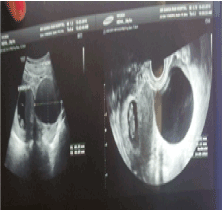
Ovarian Cysts in Early Pregnancy
Ovarian cysts are fluid-filled sacs that develop on the ovaries. They are common during pregnancy, with up to 20% of women developing one or more cysts during their first trimester. Most ovarian cysts are benign, meaning they are not cancerous. However, some cysts can cause pain, discomfort, or complications during pregnancy.
Types of Ovarian Cysts
There are several different types of ovarian cysts that can occur during pregnancy. The most common types include:
- Corpus luteum cysts: These cysts form on the ovary after ovulation. They usually disappear on their own within a few weeks.
- Follicular cysts: These cysts form when a follicle, which is a sac that contains an egg, fails to rupture during ovulation. They usually disappear on their own within a few months.
- Dermoid cysts: These cysts contain a variety of tissues, such as hair, skin, and teeth. They are usually benign, but they can sometimes become cancerous.
- Endometriomas: These cysts are filled with endometrial tissue, which is the tissue that lines the uterus. They can cause pain and infertility.
Symptoms of Ovarian Cysts
Most ovarian cysts do not cause any symptoms. However, some cysts can cause pain, discomfort, or complications during pregnancy. Symptoms of ovarian cysts can include:
- Pelvic pain
- Abdominal pain
- Bloating
- Nausea
- Vomiting
- Constipation
- Diarrhea
- Urinary frequency
- Difficulty urinating
- Vaginal bleeding
Diagnosis of Ovarian Cysts
Ovarian cysts are usually diagnosed during a pelvic exam. Your doctor may feel a cyst on your ovary during the exam. Your doctor may also order an ultrasound to confirm the diagnosis. An ultrasound is a painless procedure that uses sound waves to create images of your ovaries.
Treatment of Ovarian Cysts
Most ovarian cysts do not require treatment. However, some cysts may need to be treated if they are causing pain, discomfort, or complications. Treatment options for ovarian cysts include:
- Observation: Your doctor may recommend observation if your cyst is small and not causing any symptoms. Your doctor will monitor the cyst with regular ultrasounds to make sure it is not growing or causing any problems.
- Medication: Your doctor may prescribe medication to relieve pain or discomfort caused by an ovarian cyst.
- Surgery: Surgery may be necessary to remove an ovarian cyst if it is large, causing pain, or causing complications. Surgery is usually performed laparoscopically, which is a minimally invasive procedure that uses small incisions.
Complications of Ovarian Cysts
Most ovarian cysts do not cause any complications. However, some cysts can cause complications, such as:
- Ovarian torsion: This is a condition in which the ovary twists on its stalk. Ovarian torsion can cause severe pain and can lead to loss of the ovary.
- Cyst rupture: This is a condition in which an ovarian cyst bursts. Cyst rupture can cause pain, bleeding, and infection.
- Premature birth: Ovarian cysts have been linked to an increased risk of premature birth.
Prevention of Ovarian Cysts
There is no sure way to prevent ovarian cysts. However, there are some things you can do to reduce your risk of developing cysts, such as:
- Maintaining a healthy weight
- Exercising regularly
- Eating a healthy diet
- Avoiding smoking
- Limiting alcohol intake
Outlook for Ovarian Cysts
The outlook for ovarian cysts is generally good. Most cysts are benign and do not cause any problems. However, some cysts can cause pain, discomfort, or complications. If you are pregnant and have an ovarian cyst, it is important to see your doctor regularly to monitor the cyst and make sure it is not causing any problems.